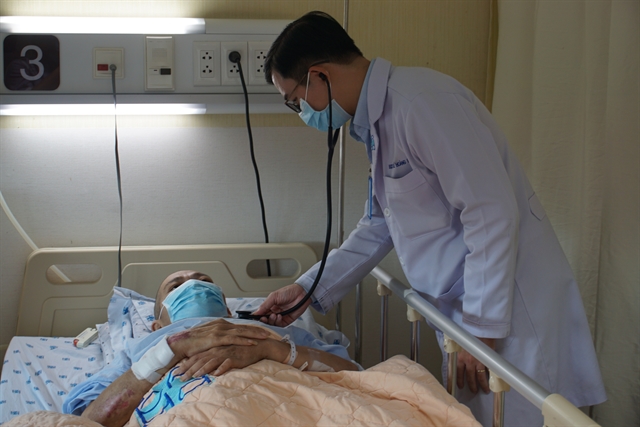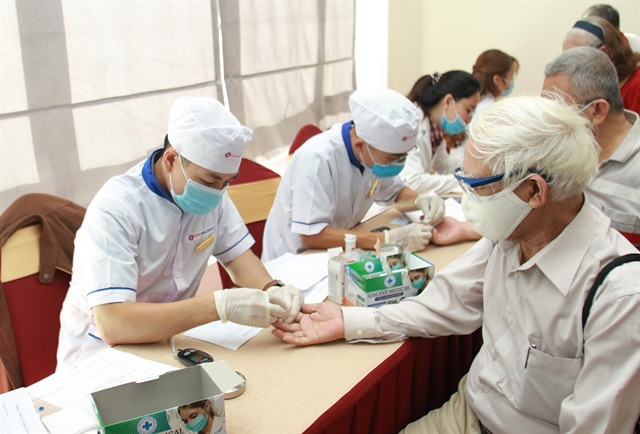 Society
Society

The incidence of type 2 diabetes in younger adults has increased dramatically in Việt Nam, doctors have said.

|
| A young man is treated for diabetes complications at the University Medical Centre in HCM City. VNS Photo Thu Hằng |
Thu Hằng
HCM CITY — The incidence of type 2 diabetes in younger adults has increased dramatically in Việt Nam, doctors have said.
Endocrinologists said that early-onset diabetes usually refers to diabetes that develops in adults under 40 years old.
Nguyễn Bình Tân, a 30-year-old man from HCM City, was hospitalised An Bình Hospital on November 10 with onset type 2 diabetes, with symptoms that included unexplained weight loss, extreme fatigue, excessive thirst, and frequent urination.
“One month ago, I suddenly lost weight and felt very tired in the morning. I lost 10 kilogrammes, from 62kg to 52kg, within a month,” he said.
“At first, I thought I had a heart problem and came to the hospital for a health check-up,” he added.
Previously, it was uncommon to find early-onset diabetes. However, more and more young people have been diagnosed with type 2 diabetes in recent years, said Dr Nguyễn Thị Lệ Hằng, head of the department of endocrinology at An Bình Hospital.
The rising incidence of type 2 diabetes among younger adults is related to rising rates of obesity, changes in dietary patterns, and sedentary lifestyles, she said.
It is crucial to promote education about the need for early diagnosis and treatment to prevent complications related to diabetes and minimise the burden of the disease.
People with risk factors such as a parent having type 2 diabetes, obesity and insufficient physical activity should have screening tests for diabetes, with just a simple blood test, she said.
Dr Hồ Đắc Phương of Nguyễn Tri Phương Hospital in HCM City said that a recent survey revealed that 60 out of 1,000 people have diabetes in the country, a three-fold increase compared to 1985.
The rate is much higher in HCM City and other cities in the country, Phương said.
The prevalence of diabetes in young people is rising due to obesity, an unhealthy diet and an inactive lifestyle, he said.
Women with gestational diabetes which can lead to type 2 diabetes in the next five to 10 years need to be strictly monitored for prevention and early diagnosis.
A 30-year-old pregnant woman with gestational diabetes, for example, might develop type 2 diabetes after 10 years, Phương said.
Children of women with gestational diabetes have a high risk factor and need to be managed for prevention and early diagnosis, according to Phương.
Screening for diabetes costs only VNĐ20,000 (US$1).
Late diagnosis and treatment can lead to a huge economic burden and affect quality of life and life expectancy.

|
| Residents in HCM City are tested for diabetes. VNA/VNS Photo |
Delayed treatment
Young people with diabetes often ignore treatment plans as well as diet and exercise management to keep blood sugar levels within the target range, because their health conditions are still good at the early stage of the disease, according to Dr Lê Hoàng Bảo from the department of endocrinology at the University Medical Centre in HCM City.
Delayed treatment can lead to serious complications that affect many parts of the body and cause heart failure, stroke, kidney failure, blindness, or lower extremity amputations.
Earlier this month, the hospital received a 36-year-old man who was hospitalised with diabetes complications. Although he was diagnosed with diabetes four years ago through a health screening programme at his workplace, he took no action to treat the disease until he was sent to hospital with swelling in his leg, a common complication of diabetes.
“I was diagnosed with diabetes four years ago but I was not aware of serious complications of the disease. I did not follow treatment and diet management, resulting in complications,” he said.
“I am so scared now of diabetes complications,” he added.
Last year, around 3.8 million people were living with diabetes and the number is expected to jump to 6.1 million by 2040, according to the Ministry of Health.
Sixty-nine per cent of adults with diabetes remain undiagnosed in Việt Nam, and only 29 per cent of people living with diabetes receive treatment at health facilities. —VNS




